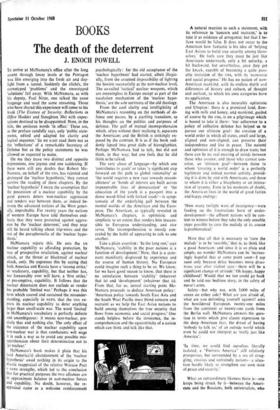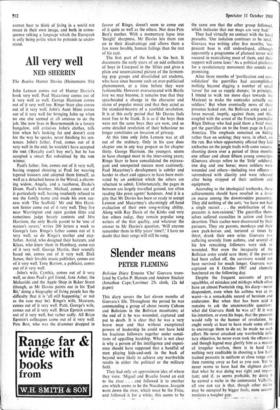The death of the deterrent BOOKS
J. ENOCH POWELL
To arrive at McNamara's office after the long ascent through lower levels at the Pentagon was like emerging into the fresh air and day- light from a tunnel. Suddenly the clichés, the stereotyped 'problems' and the stereotyped 'solutions' fell away. With McNamara, as with his deputy, Paul Nitze, one talked the same language and used the same reasoning. Those who have shared this experience will come to his book (The Essence of Security: Reflections in Office Hodder and Stoughton 30s) with expec- tations destined to be disappointed. Note, in the title, the ominous words 'in office.' These are, as the preface candidly says, only 'public state- ments, edited and adapted for clarity and logical sequence.' So we must read them not as the 'reflections' of a remarkable Secretary of Defense but as the policy statements he was allowed or expected to make.
On me they leave two distinct and opposite impressions, one joyous and one saddening. If there were still any doubts that Robert Mc- Namara, on behalf of the Usti, has rejected and destroyed the 'nuclear hypothesis,' they cannot survive the reading of these chapters. By the 'nuclear hypothesis' I mean the assumption that the possession of a nuclear capability by the great powers deters non-nuclear aggression and renders war between them, or indeed be- tween the advanced nations of the West gener- ally, improbable. For twenty years the nations of western Europe have told themselves end- lessly that they were protected against aggres- sion by the 'nuclear deterrent,' and they may still be heard talking about trip-wires and the rest of the paraphernalia of the 'nuclear hypo- thesis.'
McNamara rejects this. He sees the us nuclear capability as affording protection, by way of prospective retaliation, against nuclear attack, or the threat or blackmail of nuclear attack, only. He expresses this by saying that both America and Russia have a 'second strike,' or retaliatory, capability, but that neither has, nor foreseeably ever will have, a 'first strike,' or pre-emptive, capability. It follows that the nuclear dimension does not exclude or render less probable 'limited war.' Perhaps it was this term which caused and sustained the misunder- standing, especially in NATO, that the USA ex- pects its nuclear capability to deter anything larger than small-scale war. The word 'limited' in McNamara's vocabulary is perfectly definite and unambiguous: it means non-nuclear, pre- cisely that and nothing else. The only effect of the existence of the nuclear capability upon non-nuclear war is that combatants will wage it in such a way as to avoid any possible mis- apprehension about their determination not to . `go nuclear.'
McNamara's book makes it plain that his (and America's) abandonment of the 'nuclear hypothesis' owed nothing in its origin to the drastic reappraisal of the relative Warsaw Pact V NATO strengths, which led to the conclusion that for practical purposes the two alliances are in approximate balance in non-nuclear forces and capability. No doubt, however, the re- appraisal came as a welcome reinforcement
psychologically : for the old acceptance of the 'nuclear hypothesis' had started, albeit illogic- ally, from the assumed impossibility of fighting the Soviets successfully at the non-nuclear level. The so-called 'tactical' nuclear weapons, which are meaningless in Europe except as part of the escalation mechanism of the 'nuclear hypo- thesis,' are the sole survivors of the old theology.
From the cool clarity and intelligibility of McNamara's reasoning on the methods of de- fence one passes, by a startling transition, to his thoughts on the politics and purposes of defence. The gulf of mutual incomprehension which, often without their realising it, separates the Americans and the British is strikingly ex- posed by the contrast. It is as if the book sud- denly lapsed into great slabs of hieroglyphics. Perhaps McNamara had to talk, but did not think, in that way; but one feels that he did think as he talked.
The very abuse of language—by which one 'contributes to goals' or takes 'a significant step forward on the path to global rationality' or 'the world requires a new race towards reason- ableness' or 'bonds of interest are built across impenetrable lines of demarcation' or 'the education of the youth is a passport into a dense wood filled with forked roads'—is symp- tomatic of the underlying gulf between the mental worlds of the American and the Euro- pean. The American, as typically revealed in McNamara's chapters, is optimistic and simplistic to an extent that renders him inacces- sible to European understanding, and vice versa. The incomprehension is merely con- cealed by the habit of appearing to talk to one another.
Take a plain assertion: 'In the long run,' says McNamara, 'stability in the poor nations is a function of development.' Now, that is a state- ment manifestly disproved by experience and the course of human history. No European could imagine such a thing to be so. We know, for we have good reason to know, that there is no correlation between 'stability' (whatever that is) and 'development' (whatever that is). From that, for us, unreal starting point Mc- Namara proceeds to deduce American policy: 'American policy towards South East Asia and the South West Pacific must blend concern and restraint as we help the East Asian nations to build among themselves the true security that flows from economic and social progress.' One stands helpless before the innocence, the in- comprehension and the egocentricity of a nation which can think and talk like that.
A natural reaction to such a statement, with its reference to 'concern and restraint,' is to take it as evidence of arrogance; but that I be- lieve would be false. It does not occur to the American how fantastic is his idea of 'helping
East Asians to build true security among them- selves.' He feels sure they must be just like Americans underneath, only a bit unlucky, a
bit backward, but nevertheless, once they get the knack, capable of becoming a quite pass- able imitation of the USA, with its 'economic and social progress.' He has no notion of non- American mankind, with its endless depth and differences of history and culture, of thought and outlook, to which his own categories have no application.
The American is also incurably optimistic and Utopian: there is a promised land, flow- ing with milk and honey, and mankind, guided of course by the USA, is on a pilgrimage which is bound to take it there: 'our adherence to a policy of collective defence has helped us to pursue our ultimate goal : the creation of a world order in which all states, small and large, aligned and non-aligned, can preserve their independence and live in peace. The naiveté and optimism of it is enough to draw tears; but there can be no real meeting of minds between those who assume, and those who cannot con- ceive, an 'ultimate goal'—between those to whom 'creating a world order' is a perfectly legitimate and indeed normal activity, provid- ing it is done by and with Americans, and those to whom it is either a blasphemy or an intima- tion of tyranny. Even in his moments of doubt, the American lives in the world of good fairies and happy endings:
'How many twilight wars of insurgency—wars feeding on the frustrations born of under- development—the affluent nations will be con- tent to witness before they take the only sensible steps possible to cure the malady at its source is problematical.'
Note that all that is necessary to 'cure the malady' is to be 'sensible,' that is, to think like a good American; and since it is so plain and simple, no wonder McNamara can be 'increas- ingly hopeful that at some point soon—I say soon only because delay becomes more disas- trous year after violent year—there will be a significant change of attitude.' Oh happy, happy childhood! Would that we too could go back and be told our bedtime story, in the safety of nurse's arms.
Safety—but why not, with 3,000 miles of ocean on either side? What are you afraid of, what are you defending yourself against? asks the bewildered European, twenty-one miles from the continent or twenty-one yards from the Berlin wall. McNamara answers the ques- tion in terms which give classic expression to the deep American fear, the dread of having `nobody to talk to,' of an outside world which even he could not interpret as 'really just like America':
'In time, we could find ourselves literally isolated, a "Fortress America" still relatively prosperous, but surrounded by a sea of strug- gling, envious and unfriendly nations—a situa- tion hardly likely to strengthen our own state of peace and security.'
What an extraordinary likeness there is—one keeps being struck by it—between the Ameri- cans and the Russians, both universalists, who cannot bear to think of living in a world.not recast in their own image, and both in conse- quence talking a language which the European is only being polite when he pretends to under- stand.







































 Previous page
Previous page